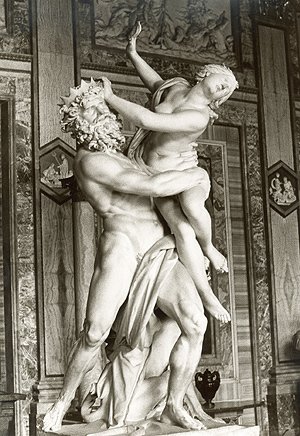[Home]
[The Olympians]
[Myths]
[Gallery]
HADES
"GOD OF THE UNDERWORLD"

Hades (meaning "the unseen") refers both to the ancient Greek underworld, the abode of Hades, and to the god of the underworld. Hades in Homer referred just to the god; the genitive , Haidou, was an elision to denote locality: "[the house/dominion] of Hades". Eventually, the nominative, too, came to designate the abode of the alive.
In Greek mythology, Hades was considered to be the oldest male child of Cronus and Rhea. According to myth, he and his brothers Zeus and Poseidon defeated the Titans and claimed rulership over the universe ruling the underworld, air, and sea, respectively; the solid earth, long the province of Gaia, was available to all three concurrently. Because of his association with the underworld, Hades is often interpreted in modern times as the Grim Reaper, even though he was not.
Hades was also called "Plouton", a name which the Romans would call him through the latinized form Pluto. The Romans would associate Hades/Pluto with their own chthonic gods; Dis Pater and Orcus. The corresponding Etruscan god was Aita. Symbols associated with him are the Helm of Darkness and the three-headed dog, Cerberus.
The term hades in Christian theology (and in New Testament Greek) is parallel to Hebrew sheol and refers to the abode of the dead. The Christian concept of hell is more akin to (and communicated by) the Greek concept of Tartarus, a deep, gloomy part of hades used as a dungeon of torment and suffering.
In older Greek myths, the realm of Hades is the misty and gloomy abode of the dead (also called Erebus), where all mortals go. Later Greek philosophy introduced the idea that all mortals are judged after death and are either rewarded or cursed. Very few mortals could leave his realm once they entered: the exceptions, Heracles, Theseus, are heroic. Even Odysseus in his Nekyia (Odyssey, xi) calls up the spirits of the departed, rather than descend to them.
There were several sections of the realm of Hades, including Elysium, the Asphodel Meadows, and Tartarus. Greek mythographers were not perfectly consistent about the geography of the afterlife. A contrasting myth of the afterlife concerns the Garden of the Hesperides, often identified with the Isles of the Blessed, where the blessed heroes may dwell.
In Roman mythology, the entrance to the Underworld located at Avernus, a crater near Cumae, was the route Aeneas used to descend to the realm of the dead. By synecdoche, "Avernus" could be substituted for the underworld as a whole. The Inferi Dii were the Roman gods of the underworld.
For Hellenes, the deceased entered the underworld by crossing the Acheron, ferried across by Charon (kair'-on), who charged an obolus, a small coin for passage placed in the mouth of the deceased by pious relatives. Paupers and the friendless gathered for a hundred years on the near shore according to Book VI of Vergil's Aeneid. Greeks offered propitiatory libations to prevent the deceased from returning to the upper world to "haunt" those who had not given them a proper burial. The far side of the river was guarded by Cerberus, the three-headed dog defeated by Heracles (Roman Hercules). Passing beyond Cerberus, the shades of the departed entered the land of the dead to be judged.
The five rivers of the realm of Hades, and their symbolic meanings, are Acheron (the river of sorrow, or woe), Cocytus (lamentation), Phlegethon (fire), Lethe (oblivion), and Styx (hate), the river upon which even the gods swore and in which Achilles was dipped to render him invincible. The Styx forms the boundary between the upper and lower worlds.
The first region of Hades comprises the Fields of Asphodel, described in Odyssey xi, where the shades of heroes wander despondently among lesser spirits, who twitter around them like bats. Only libations of blood offered to them in the world of the living can reawaken in them for a time the sensations of humanity.
Beyond lay an area, Hades, which could be taken for a euphonym of Pluto, whose own name was dread. There were two pools, that of Lethe, where the common souls flocked to erase all memory, and the pool of Mnemosyne ("memory"), where the initiates of the Mysteries drank instead. In the forecourt of the palace of Hades and Persephone sit the three judges of the Underworld: Minos, Rhadamanthus, and Aeacus. There at the trivium sacred to Hecate, where three roads meets, souls are judged, returned to the Fields of Asphodel if they are neither virtuous nor evil, sent by the road to Tartarus if they are impious or evil, or sent to Elysium (Islands of the Blessed) with the "blameless" heroes.
In the Sibylline oracles, a curious hodgepodge of Greco-Roman and Judaeo-Christian elements, Hades again appears as the abode of the dead, and by way of folk etymology, it even derives Hades from the name Adam (the first man), saying it is because he was the first to enter there.
